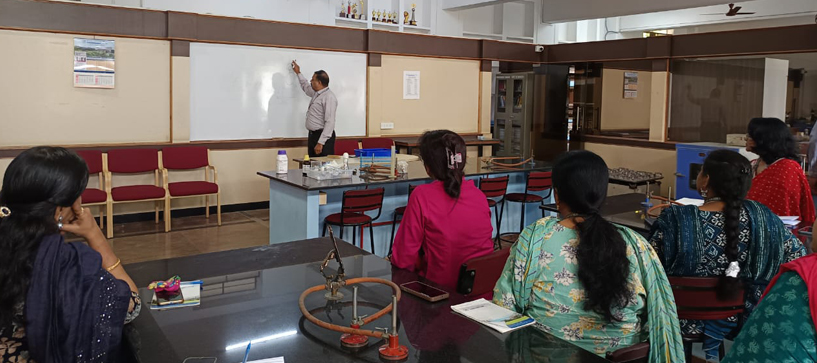
Faculty Development Programme
Faculty Development Programme on “MicroImmuno Master Class: Excellence in Laboratory Techniques”
Date: 30 June 2025 to 04 July, 2025
Department of Life Sciences organized an in- house Faculty Development Programme (FDP) on "MicroImmuno Master Class: Excellence in Laboratory Techniques" for all the faculty members of the department from 30th June 2025 to 4th July 2025. This FDP aimed to upskill and reskill faculty members with advanced theoretical knowledge and practical proficiency in critical microbiological and immunological laboratory techniques, thereby enhancing the quality of teaching, research, and empowering the practical skills of teachers. Three external experts from Government General Hospital and Research Institute, Pondicherry, Meenakshi Labs, Madurai and Anand Diagnostics - Neuberg Anand Reference Laboratory, Bengaluru delivered the talk online and deepened faculty understanding of the latest advancements, methodologies, and best practices in key microbial and immunological assays. Hands on session on standardized protocols and troubleshooting tips in microbiology and immunological techniques were delivered by Dr. Sangeetha Menon and Dr. Challaraj Emmanuel, Domain experts. The FDP was effective in training all the faculty members to deliver consistent, effective, and error-minimized practical sessions to students. Faculty members expressed their satisfaction and emphasized that the FDP provided faculty with the advanced technical skills necessary to design, execute, and analyze sophisticated experiments, thereby fostering research and innovation. They also learnt troubleshooting tips to identify, analyze, and resolve common issues encountered in the lab.
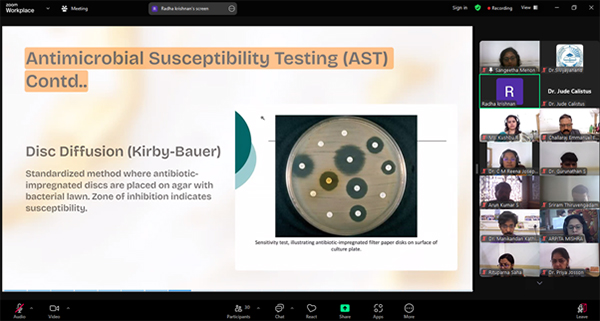
Faculty Development Programme on Animal Cell Culture
Date: 25th July to 2nd August, 2022
The Department of Life Sciences supported by DBT Star college scheme organised the Faculty development programme on animal cell culture for 8 days from 25/07/2022 to 02/08/2022. It was inaugurated by Rev. Dr. Augustine George, Principal, Kristu Jayanti College, Autonomous on 25/07/2022 at 1.30 pm. Animal cell culture technology in today’s scenario has become indispensable in the field of life sciences. It requires specific technical skills to carry out successfully. The primary aim in organising the FDP on Animal Cell Culture is to guide faculty members through fundamental areas and to demonstrate an understanding of basic concepts of cell culture as well as how to perform cell cultures and handle cell lines. The resource person for the FDP is Dr. Kushi Anand, Ph.D. India Alliance Wellcome DBT Early Career Fellow from National Centre for Biological Sciences (TIFR) Bangalore, India. The faculty were trained Cleaning, Sterilization, Aseptic Techniques, Revival of Cells, Media Preparation and Filtration, Morphology and Growth Curve of Cell Line, Sub-culturing, Cell Quantification, Maintenance of Cell Lines, Cell Harvest, MTT Assay and Interpretation of Result, Cryopreservation of Cells.
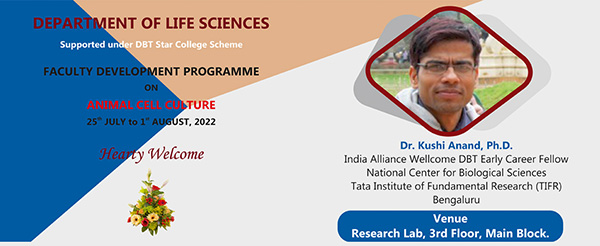
National Level Faculty Development Programme (FDP)
Date: 03.09.2021
Department of Life Sciences organized a National Level Faculty Development Programme in collaboration with the Department of Biotechnology, Government of India under the Star college scheme. The major aim of the FDP was to offer a platform for academicians form across the country to listen to and discuss cutting-edge technologies and contemporary research happening in the field of structural and computational biology. The FDP featured four key note sessions led by eminent scientists from well-known institutions in the country who are the pioneers in their own specific domains in this ever-growing field. Structural biology, an important subdomain of biology which tries to understand the structure and dynamics of biological macromolecules and its relationship with their functions has revolutionized Life Sciences and has directly or indirectly led to the progresses made in the fields of healthcare and medicine. It has also enabled us to better understand the organization of living systems. The field of structural biology is amply supported and complimented by the developments in computational Biology. Computational Biology plays an essential role in integrating the data obtained from structural studied into meaningful narrations of biological functions.
Through the four sessions of the FDP major concepts and advances in structural and computational biology were covered. The FDP provided a snapshot of the major breakthroughs in the field including next generation sequencing approaches to understand the genome structure, advances in precision medicine driven by genomic information and the application of bioinformatics for rational drug discovery.
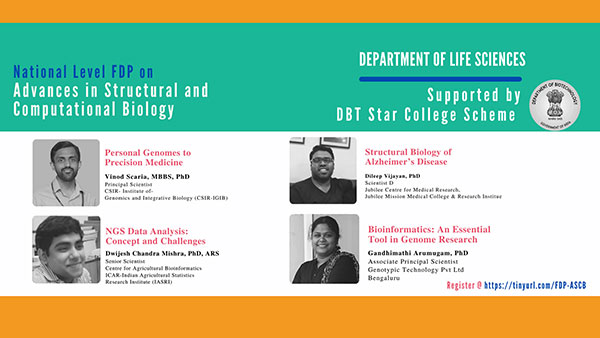
Faculty Development Programme on “Research Breakthroughs in Life Sciences”
Date: 03.05.2021
To keep abreast of the latest developments in a field of study is critical for a scholar to be a good teacher and mentor. It is also important for sustaining the passion for research enkindled. With this objective the Department of Life Sciences organised a week-long faculty development programme on “Research Breakthroughs in Life Sciences” from 3rd May 2021 to 10th May 2021.
The FDP was Inaugurated by Dr. Pravir Kumar, Professor, Department of Biotechnology, Delhi Technological University during a virtual meeting presided by Rev. Dr. Augustine George, Principal, Kristu Jayanti College. During the presidential address, Fr. Augustine briefed about importance of research and the need for new findings in the field of Biotechnology. He also appreciated the effort of the Department of Life Sciences in organising such programmes. The chief guest, Dr. Pravir shared his views and opinions about the pandemic situation and also briefed about COVID- 19 its cause, effects and Thirty-five delegates who including the faculty members of the Department of Life Sciences registered for the FDP. Eminent researchers from across the globe served as the resource persons. The table below summarises the sessions conducted as part of the FDP
Date & Time |
Session |
Resource Person |
Topic of Key note address |
May 3rd, 2021 |
Session-1 |
Dr. Pravir Kumar |
"Impact of Biomedical Engineering and Biomolecules in the reversal of neuronal disorders" |
May 4th, 2021 4.30 – 5.30 PM |
Session-2 |
Dr. Leon Ittiachen |
“Re- engineering Biological Research in 21st Century” |
May-5th, 2021 |
Session-3 |
Dr. Sri Balaji Lakshmikanthan, |
"Preconditioning Tumor Microenvironment for an Effective Immunotherapy" |
May 6th, 2021 4.30 – 5.30 PM |
Session-4 |
Dr. Mani S. Ramasamy |
“Application of Indian Medicine in Biotechnological Research” |
May 7th, 2021 4.30 -5.30 PM |
Session-5 |
Dr. Pavithra L Chavali |
“Evolution of organoid platform for research” |
May 8th, 2021 4.30 -5.30 PM |
Session-6 |
Dr. S. Senthil Kumar |
“Molecular Phylogenetics” |
May 10th, 2021 4.30-5.30pm |
Session-7 |
Dr.Indira Priyadarsini |
“Research Applications in Public Health Sector” |
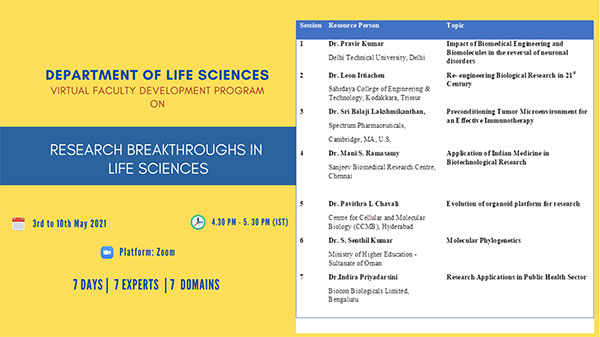
FDP on Data Analysis in Natural Sciences
Date: 06/12/2017 – 07/12/-2017
Number of beneficiaries: 30
List of Resource Persons with details:
Mr.Seby Kallarakkal, CEO, Nabler, The Digital Analytics Company Charlotte, North Carolina
Dr.Suresh KP, Senior scientist, National Institute of Veterinary Epidemiology and Disease Informatics, Bangalore
Dr.Justin Nelson Michael, Director- Research, Kristu Jayanti College
Mrs. Jyothi Manoj, Faculty, Department of Statistics, Kristu Jayanti CollegeObjective: To enhance and upgrade the knowledge on Advanced Data Analysis for management research
Session I: Introduction to Data related to life Sciences, Tests of Hypothesis
The first session was conducted by Dr. Justin Nelson, Professor, Department of Management, Director, and Center for Research who briefed about the use of SPSS (Statistical Package for Social Sciences) software in order to perform t-test and chi-square data analysis. He also emphasized on ANOVA for the analysis of variance.
Session II: Tables, Charts, Descriptive Statistics- Excel, Correlation, Regression
Professor Jyothi Manoj, Department of Statistics handled the session on how to use MS Excel in order to perform Data entry, presentation and interpretation by graphing. She also explained the tests to be done for correlation and regression using SPSS software.
Session III: Practical session on ANOVA, Regression
Dr K P Suresh, Principal Scientist, NIVEDI (National institute of veterinary epidemiology and disease information) handled the sessions on the second day. During the morning session he dealt with the theoretical aspects which focused on strengthening our foundation and perspective of statistics in relation to the field of Natural Sciences.
He also emphasized on research methodologies and the ethics and attitude to employ them which consisted of the types of hypothesis and the types of study along with the required factors. He also thought us various data collection and management procedures, suitable statistical methods and learning to interpret the results. We also learned about the availability and uses of EpiTools, an online epidemiological calculator. During the afternoon session, he conducted a practical session on VASERstat, an online site for statistical computation mainly using ANOVA, linear regression and Chi-Square test and with that the FDP- data analytic workshop concluded.

FDP on Data analysis in natural sciences
Date: 20.03.2017
Number of beneficiaries: In-house:10 | External: 15
List of Resource Persons with details:
Dr. K. P. Suresh, Ph.D (Biostatistics), Sr.Scientist, National Institute of Veterinary Epidemiology and Disease Informatics (NIVEDI), Bangalore.
Dr. Sridharan D, Chairperson, Institutional Ethics Committee, ChanRe Rheumatology & Immunology Center & Research
Objective: The FDP aims to provide comprehensive introduction to the statistical methods used in natural sciences to analyze empirical and experimental data. The FDP will also serve to bridge the gap between theory and practice. To help the budding researchers get an insight into ethics, data gathering and analysis, and statistics.
Session I: “Essentials in Research Methodology”, Dr. K. P. Suresh
The resource person briefed about identifying research topics, variables, and methodological approaches followed by data collection, assessment strategies and interpretation methods. He also added emphasis on
● reviewing the literature and formulating a research question
● drafting a research protocol
● understanding the process of applying for ethical approval
● learning research methods applicable to clinical studies
● learning how to formulate a questionnaire
● learning how to prepare papers for publication
● learning the basics of statistical analysis of data
Session II: “Ethics in Research”, Dr. Sridharan D
Ethics in research are very important when an experiment is going to be conducted.Ethics should be applied on all stages of research, such as planning, conducting and evaluating a research project.The first thing to do before designing a study is to consider the potential cost and benefits of the research.Ethical Standards :
● avoid any risk of considerably harming people, the environment, or property unnecessarily. The Tuskegee Syphilis Study is an example of a study which seriously violated these standards.
● not use deception on people participating, as was the case with the ethics of the Stanley Milgram Experiment
● obtain informed consent from all involved in the study.
● preserve privacy and confidentiality whenever possible.
● take special precautions when involving populations or animals which may not be considered to understand fully the purpose of the study.
● not offer big rewards or enforce binding contracts for the study. This is especially important when people are somehow reliant on the reward.
● not plagiarize the work of others
● not skew their conclusions based on funding.
● not commit science fraud, falsify research or otherwise conduct scientific misconduct. A con-study, which devastated the public view of the subject for decades, was the study of selling more coke and popcorn by unconscious ads. The researcher said that he had found great effects from subliminal messages, whilst he had, in fact, never conducted the experiment.
● not use the position as a peer reviewer to give sham peer reviews to punish or damage fellow scientists.
Session III: “Data Analysis”, Dr. K. P. Suresh
Data Analysis is the process of systematically applying statistical and/or logical techniques to evaluate data. While data analysis in qualitative research can include statistical procedures, many times analysis becomes an ongoing iterative process where data is continuously collected and analyzed almost simultaneously. Indeed, researchers generally analyze for patterns in observations through the entire data collection phase. The form of the analysis is determined by the specific qualitative approach taken (field study, ethnography content analysis, oral history, biography, unobtrusive research) and the form of the data (field notes, documents, audiotape, and videotape).
An essential component of ensuring data integrity is the accurate and appropriate analysis of research findings. Improper statistical analyses distort scientific findings and may negatively influence the public perception of research. Integrity issues are just as relevant to analysis of non-statistical data as well.
Considerations/issues in data analysis:
There are a number of issues that researchers should be cognizant of with respect to data analysis. These include:
● Having the necessary skills to analyze
● Concurrently selecting data collection methods and appropriate analysis
● Drawing unbiased inference
● Inappropriate subgroup analysis
● Following acceptable norms for disciplines
● Determining statistical significance
● Lack of clearly defined and objective outcome measurements
● Providing honest and accurate analysis
● Manner of presenting data
● Environmental/contextual issues
● Data recording method
● Partitioning ‘text’ when analyzing qualitative data
● Training of staff conducting analyses
● Reliability and Validity
● Extent of analysis
Session IV: “Practical session on Data Analysis”, Dr. K. P. Suresh He gave training on t test, ANOVA, Chi square test, sample distribution and hypothesis.
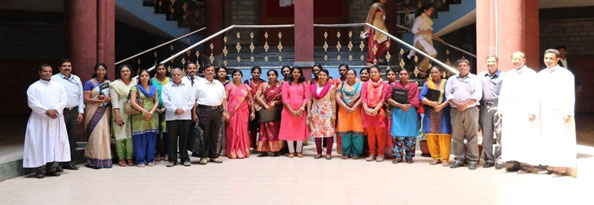
FDP on Workshop on Bioinstrumentation
Date: 19/12/2016
Objective: The objective of this hand on program is to bring together researchers from both academia and industry, to discuss and update on Bioinstrumentation
The event flagged off with a total of 16 delegates from various institutions at 10 am with the inaugural ceremony.Dr. Shiv kumar Arumugham-Vice President, Department of Biotechnology Sami labs Pvt Ltd. Bangalore, was the Chief Guest for the day. He addressed on biological product development and raw material assessment with the help of various bio instruments and its necessity for quality enhancement. Rev. Fr. Augustine George,Vice Principal presided over the function and addressed the gathering.
Then followed the first session,Dr.Elango, R & D Scientist Serene Science and Technologies, Bangalore explained the importance and working of instruments, also added on the safety measures with which it has to be handled to achieve accurate results. He also related it with diagnosis of cancer and its determination with techniques like real time PCR, quantum DOT, DNA Microarray,Laser controlled micro dissection.
The following session was taken over by Mr.Srinivasan who gave an insight, dissecting each part of the microscope and its working, explained the inside out of its mechanism.Post lunch, there was a session on the demonstration of instruments.Mr.K.Shanker, Director, Serene Science and Technologies, Bangalore, dealt with the working principle of gel documentation system, UV transilluminators, sonicator, and conventional thermal cycler.
Mr.Balaji, Application Scientist, 3i Molecular Solutions, Bangalore, described the concept of real time PCR, speedy breedy and their application in Molecular Diagnostics. Mr.Prakash of Scigenics Biotech Pvt. Ltd., Bangalore, explained about orbital shaker.Mr. Somashekar of Ultra biotech Pvt,Ltd.,Bangalore detailed on the mechanism and maintenance of laminar flowhood.

